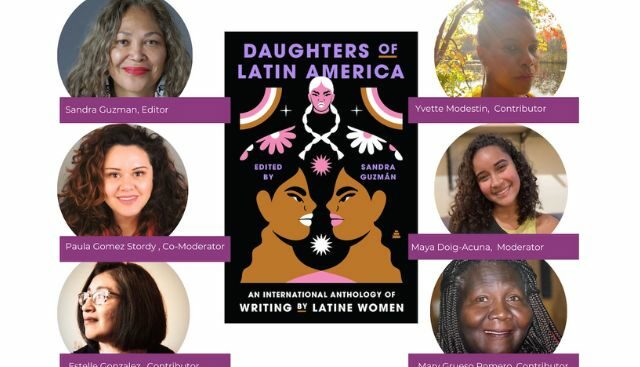Recently, Esperanza United and Encuentro Diáspora Afro hosted a virtual event highlighting “Daughters of Latin America,” a new anthology featuring writing from Latine women across the diaspora:
- Facilitated by Maya Doig-Acuna, writer and PhD candidate at Harvard University on African and African American Studies
- In conversation with Sandra Guzmán, editor and award-winning author and producer
- As well as contributors, Estella Gonzalez, Mary Grueso Romero, and Yvette Modestin.
The hour-long event, conducted in Spanglish, opened the way for inspiring conversations, powerful poem recitals, and a homage to our communities’ ancestors, especially Black and Indigenous ones, and their resilience.
Sandra Guzman, editor of the book, described how she built “Daughters of Latin America” intentionally to center the voices of the women who have been marginalized. “I go hyper into the marginalization. Center the voices of the Afro-Latina, the Indigenous Latina, the queer Latina. It is knowing that we are in the center, standing firm in our stories and tradition,” she shared. Guzman went further, discussing how the work showcases the seeds of Latina traditions across the world and our diversity: “El mito es que en Latino America se habla español… Se hablan miles de languages ancestrales.”
Without a doubt, “Daughters of Latin America” is a borderless work that creates bridges between Latin@s across the world. Its global resonance can be seen through the amazing contributors who also joined Sandra in our panel. Estella Gonzalez, acclaimed author of “Chola Salvation”, shared how her contribution to the book was an excerpt from her latest novel, “Huizache Women.” With the excerpt, she highlighted the importance of community and of curanderismo in the Mexican-American community. As a coordinator for the Health and Violence Prevention team at Esperanza United, I so appreciated Estella spotlighting the health barriers that Latin@ community members face.
Mary Grueso joined us from Colombia and expressed how “Daughters of Latin America” allowed her to raise her voice for the women who can’t. She gave a captivating recital of her poem “Si Dios Hubiese Nacido Aqui” – a poem describing God as a Black man living in the Pacific of Colombia. The poem captures the idiosyncrasies of life and culture as a Black individual living in El Pinal de Colombia. It is also a reflection of the inequities that the AfroLatin@ community faces.
Yvette Modestin shared her work “ReRooted” and talked about the relationship between grief and honoring one’s ancestors. “Black spirit guides me, protects me, sustains me, dances with me! Black spirit reminds me, I am never alone,” Modestin said. Following the sharing of her work, Modestin echoed the importance for her, as a Black Panamanian woman, of being a contributor to “Daughters of Latin America.” She asserts that the diversity within the Latin@ community, especially the realities of Afro Latin@s, needs to be highlighted and the anthology does so in a transformative and healing way.
It was an honor to witness this panel. In order to uplift Latin@ survivors, we must value and center Latin@ stories, voices, and ancestry and look into the intersections of marginalized identities within the community.
